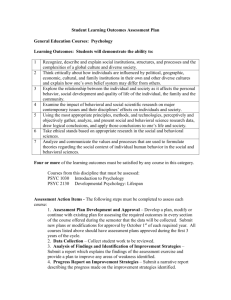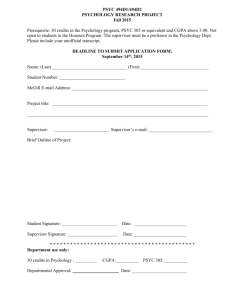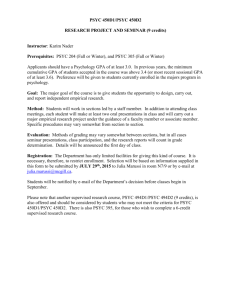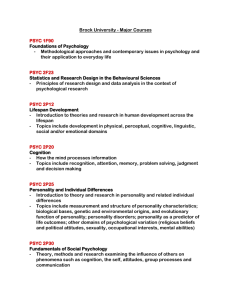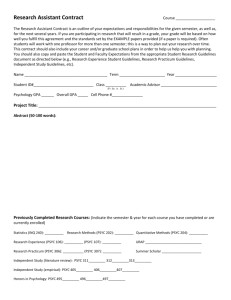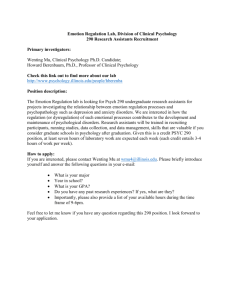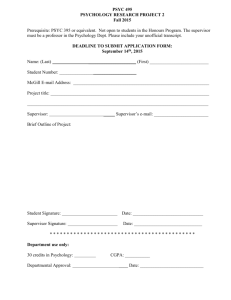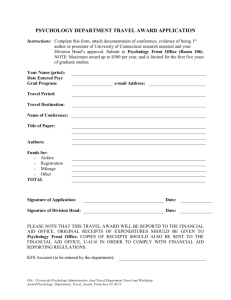Professional Psychology Brochure - University of Houston
advertisement
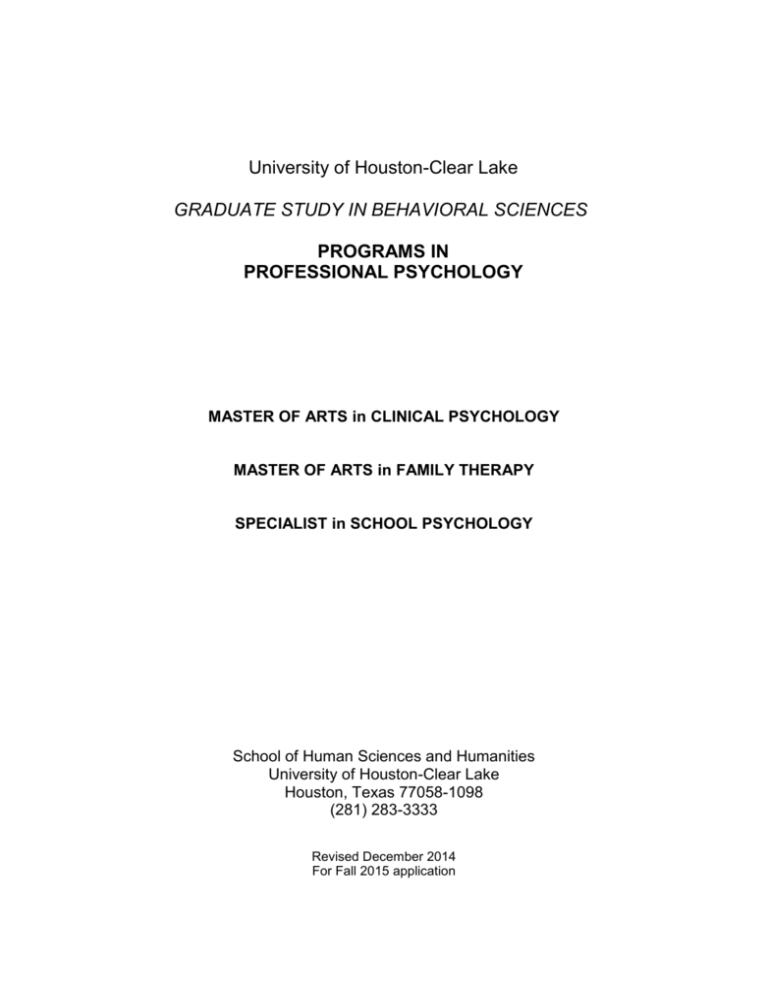
University of Houston-Clear Lake GRADUATE STUDY IN BEHAVIORAL SCIENCES PROGRAMS IN PROFESSIONAL PSYCHOLOGY MASTER OF ARTS in CLINICAL PSYCHOLOGY MASTER OF ARTS in FAMILY THERAPY SPECIALIST in SCHOOL PSYCHOLOGY School of Human Sciences and Humanities University of Houston-Clear Lake Houston, Texas 77058-1098 (281) 283-3333 Revised December 2014 For Fall 2015 application The graduate programs in professional psychology provide a breadth of background in academic theory along with specific course work and specialized training in one of three areas: (1) Clinical Psychology, (2) Family Therapy, and (3) School Psychology. The specifics of each program are described in detail in the pages that follow. Clinical Psychology and Family Therapy lead to the Master of Arts degree in the respective discipline and School Psychology to the Specialist in School Psychology degree (SSP). While completing a degree program does not automatically qualify the graduate for any specific license or clinical credential, many of our graduates meet the requirements for licensure in Texas as a Licensed Professional Counselor (LPC); a Licensed Marriage and Family Therapist (LMFT); a Licensed Specialist in School Psychology (LSSP); a Licensed Psychological Associate (LPA); or for a number of other professional credentials. For further information about credentialing, contact the Coordinator of Graduate Programs in Professional Psychology or the Advising office, School of Human Sciences and Humanities. Because enrollment is limited, admission is offered only to the most qualified applicants. The ordinary minimum standard for admission is at least a 3.25 grade point average, the prerequisite undergraduate psychology preparation for each program as listed in the program descriptions on the following pages and evidence of clinical aptitude. Application to all three programs also requires the general test of the Graduate Record Exam (current within the past five years). We prefer that applicants have all prerequisite courses completed at the time of application. Any applicant admitted who has not completed all prerequisites must do so within the first two semesters following admission to remain in good standing. The percentage of applicants accepted into the professional psychology programs generally ranges between 25% and 75% depending on the program. APPLICATION FOR ADMISSION AND SCHOLARSHIPS Applicants may apply to only ONE professional psychology program during any admissions period. There is an application fee for the program application as described below. The program application fee is in addition to the fee for university admission. A. Application for admission to a Professional Psychology Program Applying for program admission requires submitting the documents described below. There is an application fee of $35, payable to the UHCL, which is in addition to the university application fee. All applications materials must be submitted in a single envelope, including recommendations and transcripts, which the applicant submits as described below. Applicants submit GRE scores to the university following the standard reporting procedure as well as entering them onto the program application form. There are seven components to the professional psychology application: 1. An application form (at the end of this brochure or available on the university website). 2. A Curriculum Vitae (an expanded resume describing previous education, all work experience, relevant course work, any relevant volunteer activities, and honors, presentations, papers, avocations or other relevant life experiences). 3. A brief, 1000-word essay stating your reasons for wanting this training and how it fits into your career goals. For the school psychology program, the essay must also reflect knowledge of the field and roles and functions that school psychological specialists perform. 4. Three (3) Recommendations for Applicant Admission. The form can be found at the end of this brochure or on the university website. Instructions to the applicant and to the recommender are printed on the form. THE APPLICANT SHOULD COLLECT ALL RECOMMENDATIONS AND RETURN THEM IN THE APPLICATIONS ENVELOPE ALONG WITH OTHER APPLICATION DOCUMENTS. We prefer that the recommender place the form in a sealed envelope, sign his/her name across the envelope flap and onto the body of the envelope before returning the envelope to the applicant. Recommendations from academic faculty, mental health professionals, and/or work supervisors who know the applicant well are especially solicited. 5. Transcripts from all colleges and universities previously attended (except University of Houston-Clear Lake transcripts which will be generated internally). These transcripts are in addition to the transcripts sent directly to the university Admissions office. The applicant should collect all transcripts and include them in the applications envelope; 6. Scores on general test of the Graduate Record Examination (GRE) which must be current within the past five years. Official scores are reported to the university through the standard GRE process. The applicant also enters GRE scores onto the program application form as indicated. 2 7. A $35.00 check or money order made payable to: University of Houston-Clear Lake. ALL DOCUMENTS FOR CLINICAL PSYCHOLOGY MUST BE SENT IN A SINGLE ENVELOPE TO: Clinical Psychology Admissions Committee School of Human Sciences and Humanities University of Houston-Clear Lake 2700 Bay Area Blvd., MC 83 Houston, Texas 77058-1098 ALL DOCUMENTS FOR SCHOOL PSYCHOLOGY MUST BE SENT IN A SINGLE ENVELOPE TO: School Psychology Admissions Committee School of Human Sciences and Humanities University of Houston-Clear Lake 2700 Bay Area Blvd, Box 21 Houston, Texas 77058-1098 ALL DOCUMENTS FOR FAMILY THERAPY MUST BE SENT IN A SINGLE ENVELOPE TO: Family Therapy Admissions Committee School of Human Sciences and Humanities University of Houston-Clear Lake 2700 Bay Area Blvd, Box 21 Houston, Texas 77058-1098 B. Application for admission to the University Applicants are advised that they must complete a university Application for Admission and submit it and all required fees and documents to the university Admissions Office before beginning the program. Submit for summer admission. There is an application fee for university admissions, which is in addition to the program application fee. Online admissions instructions may be found on the university’s web site following the Admissions: Graduate Admissions link, or admissions information may be requested directly from the UHCL Admissions office. International students are advised to consult the relevant web pages and/or contact International Admissions in the Admissions Office as early as possible for information specific to international applicants. For further information regarding university admission contact: Admissions Office University of Houston-Clear Lake Houston, Texas 77058-1098 (281) 283-2500 http://www.uhcl.edu/ C. Timeframe for Program Application and the Admissions Process. Program applications are accepted once each academic year between December 10th and January 25th. Applications received before December 10th or after January 25th will not be accepted. It is the applicant's responsibility to insure that his/her application envelope containing all required documents is received within the dates above. After initial review of the application materials, the three admissions committees invite applicants under active consideration to campus for an interview usually during the month of March. The admissions committees notify applicants of admissions decisions usually no later than April 15th. 3 D. Additional Information regarding Applications. Any evidence of tampering with recommendations or transcripts could result in disqualifying the applicant from admission. Applicants should note that admission to graduate status at the university is not equivalent to admission to one of the professional psychology programs. In some cases, applicants may be notified of university admissions by the Advising office, School of Human Sciences and Humanities; any such communication refers only to acceptance into graduate status at the university based on the application for university admission described above in section B. This should not be confused with acceptance into one of the professional psychology programs. Applicants are not admitted into a professional psychology program until they receive formal notice from the program director that they have been accepted into the program. Applicants should direct any questions regarding the status of their application to the Coordinator, Graduate Programs in Professional Psychology. If a student is not accepted into a professional psychology program, he or she may apply for admission to another graduate program. Information regarding other programs is available in the Advising office, School of Human Sciences and Humanities. However, students pursuing other degrees should be aware of the information in the "Restricted Courses" section below. E. Scholarships. Limited scholarships for tuition and fees for professional psychology students are available on a competitive basis. Scholarships sometimes carry a waiver of out-of-state tuition for qualified recipients. For information on scholarships, applicants should contact the Scholarship Office, UHCL Scholarships, Office of Financial Aid, 281-283-2481, http://www.uhcl.edu/scholarships. . RESTRICTED COURSES It is the policy of the professional psychology faculty that only students formally accepted into one of the professional psychology programs will be allowed to register for certain theory and practice courses in professional psychology which are required for mental health credentialing. Applicants should note the following courses that are restricted to professional psychology students. Graduate students in other psychology degree programs or transitional students not yet admitted into a professional psychology program may not take restricted courses. PSYC 5111 Orientation to School Psychology PSYC 6534 Couple and Sex Therapy PSYC 5136 Multicultural Counseling PSYC 6636/6666 Clinical Internship PSYC 5138 Mindfulness and Acceptance Therapies PSYC 5832 Clinical Hypnosis PSYC 5231 Psychotherapy: Theory & Research PSYC 5236 Family Assessment PSYC 5239 Group Psychotherapy PSYC 5734 Professional Practice, Law and Ethics PSYC 5731 Basic Psychotherapy Skills PSYC 5737 Family Therapy Professional Ethics PSYC 5738 Family Therapy Practicum PSYC 6032 Intellectual Assessment PSYC 6033 Personality Assessment PSYC 6034 Consultation in School Psychology PSYC 6038 Clinical Practicum PSYC 6039 School Psychology Practicum PSYC 6111 Student Diversity in Learning PSYC 6121 Ethics and Law in School Psychology PSYC 6132 Seminar in Professional School Psychology PSYC 6133 Personality Assessment of the Child PSYC 6137 Family Research PSYC 6139 Intervention I: Academic and Cognitive Skills PSYC 6230 Intervention II: Social and Behavioral Skills PSYC 6231 Intervention III: Affective and Adaptive Skills PSYC 6233 Advanced Family Therapy PSYC 6235 Behavioral/Cognitive Therapies PSYC 6332 Intervention IV: Advanced Consultation and Program Design PSYC 6531 Psychopathology 4 REVIEW OF PROGRESS Students are evaluated annually for academic progress and appropriate professional behavior and development. An unsatisfactory evaluation may lead to probation or, in extreme cases, termination from the program. The Policies and Procedures (or Handbook) for each program contain further information regarding these matters and may be obtained from the program director for each program. CLINICAL PSYCHOLOGY The Clinical Psychology program prepares students to become mental health professionals and includes theoretical training and practical experience in psychological assessment and psychotherapy with emphasis on adults and couples. The program is a member of the Council of Applied Masters Programs in Psychology (CAMPP) and adheres to the academic and training standards of CAMPP. Graduates of the program regularly meet the requirements for licensure in Texas as a Professional Counselor and/or Psychological Associate (LPC and LPA). ADMISSIONS: Applicants must apply to the program as described above. Admission is competitive. The program accepts approximately 20 new students each year. The Clinical Psychology faculty review all applications and interview the top candidates to discuss their interest in the field and assess personal readiness for the program. In selecting candidates for the program, the faculty are concerned with (1) academic ability to complete graduate course work, (2) personal maturity and interpersonal skills necessary for mental health practitioners, (3) life experience and professional background which might enhance professional competence, and (4) motivation for and commitment to studying clinical psychology including appropriate career and professional goals. BEHAVIOR ANALYSIS (BA) CERTIFICATION: Students interested in pursuing BA certification along with the clinical psychology degree should consult with both their faculty advisor and the Director of the UHCL BA Program. PRACTICUM: Clinical Practicum is a two-semester sequence which is often the student’s first professional training contact with real clients. It is conducted in the university’s Psychological Services clinic under the supervision of a faculty supervisor, using two-way mirrors and audio- and videotaping. Practicum has two prerequisites that must be completed prior to registering for the course; see the university Catalog for further information. The program director will consult with each student as each begins the program to determine when the student will take practicum. The two-semester sequence can begin in any semester, including summer. INTERNSHIP: There are a number of facilities in the greater Houston area which provide internship training for students in the program. An intern spends 500 hours, spanning a minimum of two semesters, in a mutually selected facility where he/she is supervised by an appropriately credentialed clinician, preferably a licensed psychologist. Recent internship facilities include the Harris County Psychiatric Center (affiliated with University of Texas Medical School), University of Houston Counseling and Psychological Services, the University of Texas Mental Science Institute, and Texas Department of Criminal Justice, as well as a number of other hospitals, agencies and clinics. Internship may include the summer term. SCHOLARSHIPS: For information on scholarships, see the Scholarships section above. PREREQUISITES: Graduate admission to the university. The program requires five prerequisite undergraduate psychology courses (15 hours): Introductory Psychology, Abnormal Psychology, Social Psychology, Theories of Personality and one (3 additional hours) of upper-level psychology. Preference is given to applicants with all prerequisites completed. 2 CURRICULUM REQUIRED CORE COURSES 21 hours PSYC 5031 PSYC 5235 PSYC 5734 PSYC 6036/37 PSYC 6134 PSYC 6531 Human Growth and Development Learning Principles Professional Practice, Law and Ethicsa Research Design and Statistics I & II Biological Basis of Behavior Psychopathologya,b SOCIOLCULTURAL ELECTIVE Select 1 course, 3 hours PSYC 5136 Multicultural Counselinga PSYC 5437 Aging PSYC 5533 Psychology of Gender PSYC 5534 Minorities and Majorities PSYC 5535 Cross-cultural Perspectives on the Family PSYC 5831 Gender Perspectives in Therapy Other courses may be substituted with consent of Advisor ASSESSMENT REQUIREMENTS 2 of 3 courses, 6 hours PSYC 6031 PSYC 6032 PSYC 6033 Behavioral Assessment b Intellectual Assessmenta,b Personality Asssessment a,b THERAPY REQUIREMENTS 4 courses, 12 hours PSYC 5231 PSYC 5239 PSYC 5731 PSYC 6235 Psychotherapy: Theory and Researcha,b Group Psychotherapya,b Basic Psychotherapy Skillsa,b Behavioral/Cognitive Therapiesa,b THERAPY ELECTIVES Select 2 courses, 6 hours PSYC 5138 PSYC 5233 Mindfulness and Acceptance Therapiesa Introduction to Family Therapy FREE ELECTIVE 3 hours Students working toward the LPC should take PSYC 5335 Career Counseling SUPERVISED CLINICAL EXPERIENCE 12 hours Footnotes: PSYC 6038 PSYC 6636 PSYC 5735 Anxiety and Stress Management 2 PSYC 5736 Behavioral Medicine PSYC 6238 Applied Behavioral Analysis PSYC 6534 Couple and Sex Therapya,b Other courses may be substituted with consent of Advisor Clinical Practicum (2 semesters)a,b Clinical Internship (2 semesters)a,b aRestricted Course open only to students admitted to a professional psychology program bCourse requires one or more prerequisites—see University catalog TOTAL SEMESTER HOURS = 63 3 RECOMMENDED SEQUENCE OF STUDY These are the recommended course sequences for full-time students. In sequences 1 and 2 students complete the program in two academic years but must register in the summer following admissions and the two summers thereafter. It is possible to complete the program in two years without attending the summer after admission by taking five courses in two long semesters, which is, however, a very heavy course load. Sequence 3 offers more flexibility regarding hours per semester and summer enrollment but requires a minimum of one additional semester to complete the degree. Practicum Sequence 1 in which practicum begins in Spring1 SUMMER 1 FALL 1 Basic Psychotherapy Skills Learning Principles 1 course from this list: Psychopathology Biological Basis of Behavior Research Design and Statistics I Human Growth and Development 1 course from this list: Therapy Elective 1 Biological Basis of Behavior Therapy Elective 2 Group Therapy Sociocultural Elective Human Growth and Development Free Elective* Therapy Elective 1 or Therapy Elective 2 2 courses from list [take Basic Skills in Sociocultural Elective FALL1] Free Elective* or Basic Psychotherapy Skills SUMMER 2 Clinical Practicum§ 1 course from the FALL1 List FALL 2 Professional Practice, Law & Ethics Assessment Course‡ 2 courses from the FALL1 List SPRING 1 Psychotherapy: Theory and Research Research Design and Statistics II Behavioral/Cognitive Therapies Clinical Practicum§ SPRING 2 Assessment Course‡ Clinical Internship† 1-2 courses from the FALL1 List SUMMER 3 Clinical Internship† [1 courses from the FALL1 list if not already completed] Practicum Sequence 2 in which practicum begins in Summer2 SUMMER 1 FALL 1 Basic Psychotherapy Skills Learning Principles 1 course from this list: Psychopathology Biological Basis of Behavior Research Design and Statistics I Human Growth and Development 1 course from this list: Therapy Elective 1 Biological Basis of Behavior Therapy Elective 2 Group Therapy Sociocultural Elective Human Growth and Development Free Elective* Therapy Elective 1 Or Therapy Elective 2 2 courses from list [take Basic Skills in Sociocultural Elective FALL1] Free Elective* or Basic Psychotherapy Skills SUMMER 2 FALL 2 Clinical Practicum§ Professional Practice, Law & Ethics 1 course from the FALL1 List Assessment Course‡ Clinical Practicum§ 1 course from the FALL1 List SUMMER 3 Clinical Internship† [1 course from the FALL1 list if not already completed] 4 SPRING 1 Psychotherapy: Theory and Research Research Design and Statistics II Behavioral/Cognitive Therapies 1 course from the FALL1 List SPRING 2 Assessment Course‡ Clinical Internship† 1-2 courses from the FALL1 List Practicum Sequence 3 in which practicum begins in Fall2 SUMMER 1 FALL 1 2 courses from this list: Learning Principles Biological Basis of Behavior Research Design and Statistics I Human Growth and Development 2 courses from this list: Therapy Elective 1 Biological Basis of Behavior Therapy Elective 2 Group Therapy Sociocultural Elective Human Growth and Development Free Elective* Therapy Elective 1 Or Therapy Elective 2 1 course from list and Sociocultural Elective Free Elective* Basic Psychotherapy Skills Or 1 course from the list & Basic Psychotherapy Skills SUMMER 2 FALL 2 1-2 courses from the FALL1 List Professional Practice, Law & Ethics Or Assessment Course‡ 1 course from list and Clinical Practicum§ 1 course from the FALL1 List Basic Psychotherapy Skills SUMMER 3 FALL 3 Clinical Internship† Clinical Internship† [1 course from the FALL1 list if not [1-2 courses from the FALL1 list if not already completed] already completed] SPRING 1 Psychotherapy: Theory and Research Research Design and Statistics II Psychopathology Behavioral/Cognitive Therapies SPRING 2 Assessment Course‡ Clinical Practicum§ 1-2 courses from the FALL1 List § Clinical Practicum is a two-semester sequence which can begin in Spring 1, Summer 2 or Fall 2 as shown in the examples above. Practicum placement will be negotiated with each student based on several factors including tenure in the program, completion of prerequisites and individual needs and preferences. † Clinical Internship is a two-semester sequence, requiring 500 clock hours of clinical training in a mutually selected facility. At least one semester of Clinical Practicum and Professional Practice, Law and Ethics must be completed before beginning internship. It is recommended that students also complete the other specific courses listed for Fall 1, Spring 1 and Fall 2 and Group Therapy prior to internship. ‡ Students should take either Intellectual Assessment or Personality Assessment in Fall 2 and the remaining course in Spring 2. *PSYC 5335 Career Counseling is required for all students working toward LPC licensure, though it is not a degree requirement in the curriculum. Part-time students should note the sequencing of courses listed here as well as being aware of prerequisite requirements for many courses. 5 FAMILY THERAPY The Family Therapy Program provides academic course work, clinical training, and supervision that prepare students for careers as creative, caring and competent professional family therapists. The program is accredited by the Commission of Accreditation for Marriage and Family Therapy Education (AAMFT.org) and prepares the student for licensure as a Marriage and Family Therapist (LMFT) in Texas. The UHCL Family Therapy Program prepares students to do research-informed, relationally oriented therapy with couples, families, individuals, and groups. PROGRAM GOALS AND OBJECTIVES: Provide high quality theoretical knowledge in the field of family therapy Teach a wide range of empirically-based intervention strategies Provide supervised clinical experiences from systems/relational perspectives Provide learning opportunities designed to increase students’ self-awareness and teamwork skills Provide an understanding and respect for cultural diversity Meet community needs for qualified marriage and family therapists Prepare students to meet the requirements for clinical membership in the American Association for Marriage & Family Therapy (AAMFT) and for licensure as Marriage and Family therapists in Texas ADMISSIONS: Admission to the program is competitive, and draws applications nationwide. Applicants must submit all materials as described in the introductory section of this brochure. Approximately 18 students are accepted each year. The selection process generally proceeds as follows. Initially, the Family Therapy faculty reviews all applications. A pool of applicants are then selected and invited for group interviews and activities. In selecting candidates for the program, the faculty are concerned with (1) ability to do graduate level work, (2) personal maturity and interpersonal skills necessary for clinical work, (3) life and professional experience which could be expected to enhance professional competence, (4) motivation and commitment concerning a career in family therapy, and (5) personal readiness or appropriateness for training at this time. PRACTICUM: Clinical experience typically begins during the second year with family therapy practicum in the university’s Psychological Services clinic under the supervision of an LMFT Board/AAMFT - approved supervisor. Supervision is conducted live with videotaping of sessions. The practicum is a two semester commitment. INTERNSHIP: There are a number of off-campus facilities that provide training sites. Students are supervised by LMFT Board Approved/AAMFT - approved supervisors. Recent facilities include: The Council on Alcohol and Drugs, Depelchin Children’s Center, Houston-Galveston Institute, Clear Creek Independent School District and many more throughout Houston. The internship requires three semesters for a total of nine semester credit hours. Students need to complete 400 total hours of direct client contact (combining practicum & internship) in order to graduate. SCHOLARSHIPS AND STUDENT AID: Some scholarships, financial aid, and instructor assistance positions are often available to students as described in the introductory section of this brochure. There are some need-based scholarships for secondyear family therapy students. CURRICULUM: The Family Therapy curriculum is outlined below. PREREQUISITES: Admission to the University; Undergraduate courses in Introductory Psychology and Abnormal Psychology. Note: Similar content across various undergraduate courses with different titles may fulfill the above course prerequisites. Recommended undergraduate courses are research and statistics and child development. No undergraduate course may be counted toward degree requirements in family therapy. 6 CURRICULUM PSYC 5233 Intro Family Therapy PSYC 5236 Family Assessment PSYC 5239 Group Psychotherapy PSYC 5433 Substance Abuse PSYC 5535 Cross Cultural Perspectives PSYC 5731 Basic Psychotherapy Skills PSYC 5737 Family Therapy Prof Ethics PSYC 5738 Practicum - 2 Semesters PSYC 5931 Individual And Family Development PSYC 6137 Family Therapy Research PSYC 6233 Advanced Family Therapy PSYC 6234 Systems And Symptoms PSYC 6236 Child/Adolescent Family Therapy PSYC 6531 Psychopathology PSYC 6534 Couple And Sex Therapy PSYC 6636 Internship - 3 Semesters Elective (PSYC 5231 Or 5335 Or Faculty Approved) Total Semester Hours TYPICAL 3 YEAR CURRICULUM Summer Year 1 Year 2 PSYC 5239 – Group Psychotherapy *Consider taking elective Year 3 PSYC 6636 – Internship 3 3 3 3 3 3 3 6 3 3 3 3 3 3 3 9 3 60 Fall Spring PSYC 5233 – Intro to Family Therapy PSYC 5731 – Basic Psychotherapy Skills PSYC 5737 – Family Therapy Professional Ethics PSYC 5236 – Family Assessment PSYC 6531 – Psychopathology PSYC 6534 – Couples & Sex Therapy PSYC 6137 – Family Research PSYC 6233 – Advanced Family Therapy PSYC 5535 – Cross-Cultural PSYC 6236 – FT w/ Child. & Adolescents PSYC 5738 – Practicum PSYC 6234 – Systems and Symptoms PSYC 5931 – Lifespan PSYC 5433 – Substance Abuse PSYC 5738 – Practicum PSYC 6636 – Internship PSYC 6636 - Internship 7 *Consider taking elective SCHOOL PSYCHOLOGY Please note: the School Psychology Student Handbook contains further information regarding the program and its policies and procedures. Program Philosophy/Mission: The UHCL School Psychology program is based on the philosophy that all children can learn and that school psychological specialists privileged to work with children must be ethical, responsible, and competent in addressing each child’s individual psycho-educational needs. To accomplish this, students must develop a foundation for school psychological services based on core knowledge and the ability to apply various skills in assessment, intervention, and consultation. The program provides theoretical knowledge and applied training in order to address the behavioral and educational problems of children and adolescents. Focus of Training: The UHCL School Psychology program is based on a collaborative, data-based problem-solving model of training. Specialists in school psychology are trained to engage in a variety of roles and functions as part of a broader education-based model of service delivery and as members of a multidisciplinary team. The major roles and functions involve assessment for learning, developmental, behavioral, and emotional conditions; planning, developing, and assisting in the implementation of academic and behavioral interventions based on assessment data; engaging in individual and group counseling; crisis intervention; consulting with parents, school personnel, and other professionals regarding learning and behavioral difficulties; and conducting activities designed to address both primary and secondary prevention, including inservice training and participation in problem-solving/RtI school based committees. Competency in school psychology is measured through the NASP Standards of professional practice. These Standards are outlined in the School Psychology Student Handbook. Accreditation and Licensing: The UHCL School Psychology program is approved by the National Association of School Psychologists (NASP). As graduates of a NASP-approved program and upon successful completion of the national examination in school psychology, students are eligible for the Nationally Certified School Psychologist (NCSP) credential. Graduates also meet the training standards for the Licensed Specialist in School Psychology (LSSP), which is the license required for school psychology practitioners in the state of Texas. Students may also meet the training standards for the Licensed Psychological Associate (LPA) credential depending on the accumulation of additional internship hours and experiences. Both the LSSP and LPA credentials require passing national and state examinations and are issued by the Texas State Board of Examiners of Psychologists. Re-Specialization Policy: Students who have a graduate degree and are interested in supplementing their academic background in order to obtain school psychology licensure in Texas (LSSP) and/or national certification (NCSP) may apply to the program as outlined for all students, and, if accepted, can develop a modified plan of studies to meet both credentialing and UHCL Program requirements. At minimum, such students will take the School Psychology Practicum, Seminar in Professional School Psychology, Consultation and Internship courses and must meet the substantial equivalent of the UHCL School Psychology Program (the School Psychology Student Handbook has additional information regarding course equivalency). It must be emphasized that the above credentials are granted by boards and not by any academic program. Application to the Program: The School Psychology selection committee accepts only a limited number of students into the program (approximately 12 to 14 students) based on a review and evaluation of the criteria required for application. These criteria include: complete application (application form, vita, essay outlining the applicant’s professional goals and demonstrating knowledge of the field of the school psychology, and three letters of recommendation); official transcripts; and a GPA of 3.25 or better; and 12 hours of undergraduate coursework (Introductory Psychology, Child Psychology, Abnormal Psychology, and an upper-level psychology course). A GRE score of ≥145 for V & Q is preferred. The prerequisites may be waived for students who have graduate degrees, and in some cases, an equivalent course may substitute for a prerequisite. Applicants being considered for admission must also undergo an interview process with the school psychology faculty. Annual Evaluation and Acceptance to Candidacy: Students are evaluated on an annual basis by the School Psychology faculty to determine their progress in the program. Upon completion of the second year of the program, students are also evaluated for Candidacy (suitability for internship), as determined by an evaluation by the field-based practicum supervisors and faculty. Only students accepted to candidacy may proceed to Internship. The School Psychology Student Handbook has additional information regarding this process. Internship: The School Psychology program recognizes internship as the culminating experience in specialty training. The internship consists of a minimum of 1200 clock hours in a school setting and occurs during the final year of training; it is designed to be accomplished on a full-time basis over a period of one academic year. There are some exceptions allowed to the 8 requirements noted above, but such exceptions are rare and would occur on an individual basis and in consultation with the School Psychology Internship Coordinator and program faculty. The School Psychology Internship Coordinator arranges each intern’s placement in consultation with the potential intern and School Psychology faculty. End-of-Program Evaluation: Students are required to: (a) take the National School Psychology Examination as the graduate comprehensive examination, and (b) submit a portfolio of their work demonstrating that they have competencies in each of the NASP Standards of practice. The national examination is taken after acceptance to candidacy. The portfolio is submitted during the final semester of internship and is evaluated by the School Psychology faculty. Successful completion of the School Psychology program involves a minimum cumulative GPA of at least 3.00 (only courses with a grade of B- or above can be counted toward the degree), obtaining a passing score on the national examination, and obtaining an overall competency rating of “adequate/entry level” or above on the portfolio evaluation. Coursework: The UHCL School Psychology program is a 70-hour program and is sequentially organized. It is designed to be a full-time program that requires three years to complete. It is not possible to maintain full-time employment in Year 2 of the program. Most course requirements during this year require students to be in public schools for a substantial number of hours during the week. Employment is prohibited in Year 3 as students are completing a full-year of internship under contract with a public school district. Most courses are only offered in the semester listed, and all students must follow this sequence. Any modifications in the sequence must be approved by the School Psychology faculty. The specific curriculum by semester is as follows: SCHOOL PSYCHOLOGY PROGRAM SEQUENCE 2015-2016 Summer PSYC 5031: Human Growth & Dev. Prerequisites if needed PSYC 6134: Biological Basis of Behavior Summer – Year 1 PSYC 6139: Intervention I: Academic and Cog Skills* PSYC 6133: Personality Assessment of the Child* Fall – Year 1 PSYC 6036: Research & Statistics I* PSYC 5235: Learning Principles* PSYC 5131: Psychopathology of Childhood* PSYC 5111: Orientation to School Psychology* Fall – Year 2 PSYC 6034: Consultation in School Psychology* PSYC 6121: Ethics and Law in School Psychology* PSYC 6111: Student Diversity in Learning* PSYC 6039: School Psychology Practicum* Fall – Year 3 PSYC 6666: Internship Summer – Year 2 PSYC 6132: Seminar in Professional School Psychology* PSYC 5233: Intro. to Family Therapy *These courses only offered in the semester designated Spring – Year 1 PSYC 6037: Research & Statistics II* PSYC 6032: Intellectual Assessment PSYC 6238: Applied Behavior Analysis* Spring – Year 2 PSYC 6230: Intervention II: Social & Behavioral Skills* PSYC 6231: Intervention III: Affective and Adaptive Skills* PSYC 6332: Advanced Consultation and Program Design/Evaluation* PSYC 6039: School Psychology Practicum * Spring – Year 3 PSYC 6666: Internship The School Psychology program is a nationally approved program of continuous study and consists of a total of 70 semester hours. The School Psychology program is very rigorous and requires full-time enrollment to complete in 3 years. While employment can be maintained in Year 1, full-time employment is not possible in Year 2. During the second year, 16 hours per week (2 days) of Practicum in the schools are required for each semester. In addition, there are some courses that are offered in the day and many course requirements must be completed in the schools during the day. Employment is not allowed in Year 3 as the internship is full-time. 9 FACULTY in PROFESSIONAL PSYCHOLOGY Steven Bistricky, Ph.D. (University of Kansas) Assistant Professor, Psychology (Clinical Psychology) – Depression and Anxiety, Cognitive Functioning, CognitiveBehavioral Interventions. Matthew Brown, Ph.D. (Texas Tech University) Assistant Professor, Family Therapy – Family Research, Family Assessment, Practicum, Advanced Family Therapy, Group Therapy; AAMFT Clinical Fellow; AAMFT Supervisor in Training; Licensed Marriage and Family Therapist (Texas) Gail Cheramie, Ph.D. (University of Southern Mississippi) Associate Professor, Psychology (School Psychology) – Intellectual and Personality Assessment, Behavioral Assessment and Intervention, and School-Based Consultation; Director, School Psychology Program; Licensed Psychologist (Texas); Nationally Certified School Psychologist; Licensed Specialist in School Psychology (Texas) Angela Dobbins, Ph.D. (University of Florida) Assistant Professor, Psychology (School Psychology) – Orientation to School Psychology, School-Based Consultation, Advanced Consultation and Program Design/Evaluation, Intervention I: Academic and Cognitive Skills, Intervention II: Social & Behavioral Skills. Sara Elkins, Ph.D. (University of Tennessee) Assistant Professor, Psychology (Clinical Psychology) – Basic Psychotherapy; Psychotherapy: Theory and Research; Personality Assessment; Clinical Practicum; Behavioral Parent Training; Licensed Psychologist (Texas) Emily Kahumoku-Fessler, Ph.D. (Auburn University) Assistant Professor, Family Therapy – Professional Development and Ethics, Advanced Family Therapy, Family Therapy Practicum, Couples and Sex Therapy, Systems and Symptoms, Group Therapy; Licensed Marriage and Family Therapist (Texas) Afshana Haque, Ph.D. (St. Mary's University) Assistant Professor, Family Therapy - Cross Cultural Perspectives of the Family, Introduction to Family Therapy, Substance Abuse, Life Cycle of the Family, and Practicum; Licensed Marriage and Family Therapist (Texas) Leslye Mize, Ph.D. (Texas Woman’s University) Visiting Professor Emeritus, Family Therapy – Coordinator of Internship and Accreditation for Family Therapy; Licensed Marriage and Family Therapist and Supervisor; Licensed Professional Counselor and Supervisor; AAMFT-Approved Supervisor; AAMFT Clinical Fellow. William Norwood, Ph.D. (University of Houston) Associate Professor, Psychology (Clinical Psychology) – Cognitive-Behavioral Psychotherapy, Psychological Assessment, Forensic Psychology, Substance Abuse, Domestic Violence, Ethics; Licensed Psychologist (Texas) Mary Short, Ph.D. (Western Michigan University) Associate Professor, Psychology (Clinical Psychology) – Child Health Psychology, Health Promotion, Adolescent Sexual Behavior, Child and Adult Behavioral Therapy. Director, Clinical Psychology Program. Mary Stafford, Ph.D. (University of Texas at Austin) Associate Professor, Psychology (School Psychology) – Child Counseling, Crisis Intervention, Intervention for Children with Emotional Disorders, Child Psychopathology and Behavior Problems, Biological Basis of Behavior; Licensed Psychologist (Texas); Nationally Certified School Psychologist; Licensed Specialist in School Psychology (Texas); Nationally Certified Community Crisis Response Team Trainer; Director, UHCL Psychological Services Clinic 10
